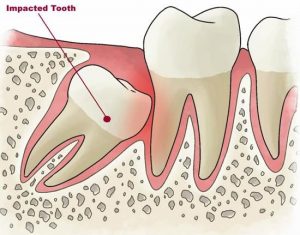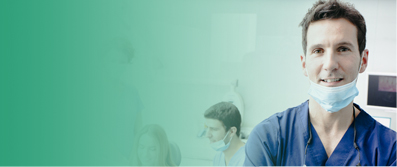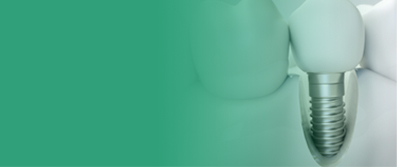What is Oral Surgery? Generally, minor oral surgery refers to small operations including the removal of wisdom teeth, impacted and severely broken-down teeth, as well as apicectomies, biopsies along with other procedures.
At the Sterling Private Clinic, we carry out a variety of oral surgical procedures and the most common include the removal of teeth that are decayed, impacted, or require removal for orthodontic reasons. Also, a tooth or teeth may require extraction if infection occurs in the tissues and bones that surround and support the teeth, causing them to loosen.
Wisdom teeth, otherwise known as third molars, are the last set of teeth to develop. Sometimes these teeth emerge from the gum line and the jaw is large enough to allow room for them, but most of the time, this is not the case. More often, one or more of these third molars fails to emerge in proper alignment or fails to fully emerge through the gum line and becomes entrapped or “impacted” between the jawbone and the gum tissue.
 Impacted wisdom teeth can result in swelling, pain, and infection of the gum tissue surrounding the wisdom teeth. In addition, impacted wisdom teeth can cause permanent damage to nearby teeth, gums, and bone and can sometimes lead to the formation of cysts or tumors that can destroy sections of the jaw. Therefore, dentists recommend people with impacted wisdom teeth have them surgically removed.
Impacted wisdom teeth can result in swelling, pain, and infection of the gum tissue surrounding the wisdom teeth. In addition, impacted wisdom teeth can cause permanent damage to nearby teeth, gums, and bone and can sometimes lead to the formation of cysts or tumors that can destroy sections of the jaw. Therefore, dentists recommend people with impacted wisdom teeth have them surgically removed.
We provide oral surgery through Oral (injection of local anesthesia), Relative Analgesia (nitrous oxide “laughing gas” and oxygen) and Intravenous Sedation (for the nervous patient, see below).
Local anesthesia involves the administration of a local anesthetic to numb the area, for the safe, comfortable and painless removal of teeth. The patient is awake and alert at all times. This is an extremely safe procedure and involves minimal pain.
For anxious patients we can use Sedation, Oral IV, or Relative Analgesia to help them safely get dental treatment they need. For children, oral surgical procedures can be carried out safely with Relative Analgesia Sedation.
If you are particularly nervous, anxious or have a phobia of dentistry, sedation is an excellent way to manage your anxieties. It is recommended for patients aged 18 or over.
Conscious sedation is a procedure that makes use of sedative medications (usually a single drug such as midazolam), administered into a small vein on the back of the hand/crease of arm. This produces a relaxed experience for the patient so the dentist can safely carry out your dental treatment, whilst monitoring you carefully.
Unlike General Anaesthesia where a patient is completely unconscious, asleep and unable to respond, patients under Conscious Sedation are able to respond to commands.
Yes, in fact most procedures are done with conscious sedation outside of the Hospital setting.
The drugs used for IV sedation produce either a partial or full memory loss (amnesia) for the period of time when the drug is first administered till when it wears off. Local anaesthetic is used in the mouth while you are sedated to ensure your dental treatment is carried out painlessly and for your post-operative comfort.
The effects of sedative medicine take some time to wear off and your dentist will tell you how long the drugs will take to clear from your body. You won’t be able to drink alcohol, drive or work machinery during this time.
You are required to bring an escort to look after you immediately after the procedure and post procedure.
You can be helped to feel relaxed by ‘relative analgesia’, sometimes called ‘inhalation sedation’. This means breathing in a mixture of nitrous oxide and oxygen (‘laughing gas and air’) which quickly leads to a pleasant, relaxed feeling.
The dental team will put you at ease at the same time, by talking softly and suggesting what you feel. You are still conscious all the time, although you may be a little drowsy, and any treatment given causes you no discomfort.
You breathe in the mixture through a nosepiece, which is very comfortable. You can’t overdose on the gas, as the mixture quickly leaves the body if you breathe in one or two breaths of ordinary air. There are no after-effects either, and you can drive a car after about 15 minutes. Many dentists use this safe and effective technique.
Our specialists are experienced in the removal of teeth, often ensuring that procedures are carried out without the need of any surgical intervention, which reduces the time, risk and discomfort of the procedure.
We have especially trained dentist at our practice who are experienced in all oral surgery procedures and many who have been carrying out sedation for many years. They can help you relax, allowing you to be able to complete your dental treatment to restore your oral health. In many cases we have been able to help patients overcome their dental anxiety and receive painless treatment without sedation after having their trust restored.

